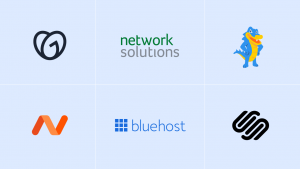Key takeaways:
- Registering a domain under fake credentials is generally prohibited and comes with consequences like domain suspension.
- Using legitimate details is important for registration to verify domain ownership.
- If security and privacy is your concern, most registrars offer services that obfuscate your information on the WHOIS database.
Many people hesitate to use real information for domain registration due to privacy concerns. After all, you don’t want your private information freely available on the web. But can you register a domain under a fake name?
No, registering a domain under an alias can lead to consequences like domain suspension or permanent domain loss. Fortunately, there are legitimate ways to protect your personal information when registering a domain.
This article explains why using real data is necessary for domain registration, the consequences of using fake details, and your legal options for privacy protection.
Can I use fake information to register a domain name?
No, the Internet Corporation for Assigned Names and Numbers (ICANN) handles domain name registration policies and requires legitimate and verified information from registrants. Such due diligence is enforced by domain registrars.
One of ICANN’s key policies requires that anyone registering a domain provide accurate information, which appears in the WHOIS database — a publicly accessible database containing the domain registrant’s details, including their real name, contact information, and address.
Why do you need to use real data when registering a domain?
ICANN requires accurate information because it ensures registrants’ accountability. Here’s why using real data for domain registration is important:
- Verification of domain ownership
- Registrant reachability
- Ensuring accountability
Verification of domain ownership
Domain registrars use WHOIS data to confirm domain ownership. This prevents disputes and unauthorized transfers, ensuring each domain belongs to the right owner. Consider it like leasing an apartment: landlords require your real identity to prevent fraudulent actions. A domain is your property. With accurate details, registrars can verify ownership, protect the registrant’s rights, and reduce the likelihood of fraud.
Registrant reachability
Real information helps reach registrants quickly when problems arise, such as security risks, website abuse, or renewal reminders. If authorities can’t reach a domain owner, they might miss critical notices, resulting in domain suspension or loss.
Ensuring accountability
ICANN’s policy on accurate WHOIS ensures domain owners are accountable for the content they host. There have been dozens of cases involving spam, illegal activity, or copyright infringement. Accurate records help authorities trace issues to the domain owner, promoting a more responsible online environment.
What are the risks and penalties for providing fake information?
Using fake details might seem harmless, but it actually comes with significant risks and potential consequences that can impact the credibility of your online presence.
If you provide false information when registering a domain, you’re looking at two serious consequences: domain suspension/revocation and loss of credibility as serious consequences.
Let’s delve in:
Domain suspension or revocation
If a domain registrar detects fake information or receives a report, it may suspend your domain. This results in an inaccessible website, linked emails stop functioning, and visitors find a “domain under review” page.
If you fail to address the fake data, you might lose the domain entirely, damaging your brand.
Loss of credibility and reputational harm
If customers or partners discover that your domain registration contains inaccurate information, they may lose trust in the brand, viewing it as unreliable or dishonest. This loss of trust can have long-term effects since current customers highly value authenticity and transparency.
What happens if someone reports that your domain registration uses a fake name?
When a registrar receives a report alleging an inaccurate or fake domain name registration, ICANN regulations require them to investigate. Here’s what happens:
- Registrar notification
- Time to respond and correct information
- Potential domain suspension
- Permanent loss of domain name
- Registrar notification
The registrar will notify the domain name owner, inform them of the issue, and request immediate action to verify or update the information. This notice often includes a deadline, typically within 15-30 days, for the registrant to respond and provide accurate data.
- Time to respond and correct information
The domain owner must respond within the specified period by confirming the information is accurate or updating it to ensure compliance. If the domain name owner fails to update the information or does not respond, the registrar will consider this a compliance failure.
- Potential domain suspension
If the registrant fails to respond or provides no corrections, the registrar may suspend the domain name. During suspension, the registrar takes the domain offline, which can severely impact businesses that rely on online presence or customer communications.
- Permanent loss of domain name
Avoiding the issue can lead to the registrar revoking the domain. When this happens, the domain name becomes available for purchase. Losing a domain name this way can damage a business’s reputation and disrupt brand continuity, often forcing it to seek costly alternatives or rebrand.
What are the alternatives to using a fake name to protect your privacy?
There are legitimate ways to keep your personal information secure if you’re concerned about privacy and security risks during domain registration. Here’s a look at the best options:
- Register a domain with Privacy + Protection
- Using a business address
- Regularly updating information
Register a domain with Privacy + Protection
Network Solutions’ Privacy + Protection safeguards your private data from malicious activity. Normally, your name, address, email, and phone number are publicly visible in the WHOIS database. However, with the Privacy + Protection feature, your data in the database becomes obfuscated.
Though we’ll still need your personal information as part of the registration process, we replace your information in the WHOIS directory with the proxy details. This ensures a successful domain purchase without risking your security.
Most importantly, Network Solutions lets you register a domain privately without violating ICANN’s policies. That is because we, the domain registrar, remain the contact point for all official inquiries, so you fully comply with ICANN requirements without publicizing your personal information.
Note: While the domain privacy protection service is an excellent solution for securing your information, not all top-level domains (TLDs) can have a private WHOIS listing. Some ccTLDs (Country-Code Top Level Domains) don’t allow privacy — other extensions like .au and .sg don’t support the WHOIS privacy service.
Using a business address
If domain privacy protection isn’t available or suitable, consider using a business address or a P.O. Box. Many domain registrants use this approach to remain private while complying with ICANN’s accuracy requirements.
Regularly updating information
Another way to ensure privacy while remaining compliant is to review your WHOIS database information regularly. Addresses, emails, and phone numbers may change over time. Schedule a routine check to prevent issues — perhaps once a year or after any major move. Once you change addresses or emails, make sure to update your information right away.
Keep your domain names secure and compliant
Using your real name is important when registering a domain. Doing so keeps you compliant with ICANN regulations, protects your online presence, and avoids the risk of suspension or revocation.
If you’re really concerned about security risks and identity theft, you can always add a domain privacy service along with your domain purchase at Network Solutions. We can help you keep your personal information hidden from the public!
Frequently asked questions
No, using a fake address for a domain registration violates ICANN policies. Registrars require accurate contact information to ensure compliance and allow for contact with the domain owner if needed.
A false domain name usually refers to a domain name registered with inaccurate or misleading information, such as a fake name, wrong address, or other contact details. Using false information is a violation of ICANN’s requirements and can result in penalties, including domain name suspension.
No, a domain name must be registered to use it on your website. Registration is reserving a domain name and making it accessible for web use. Without registration, the domain remains available for anyone to claim, and you won’t be able to use it for a website or email.
No, you can’t have complete anonymity when registering a domain since ICANN requires a real name for the registration process. You may face serious legal matters if you use fake names for your domains. However, you may purchase a domain privacy service from your provider to hide your private information.




